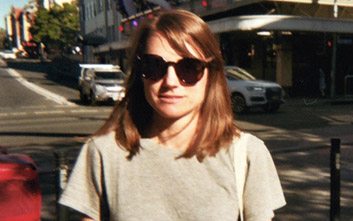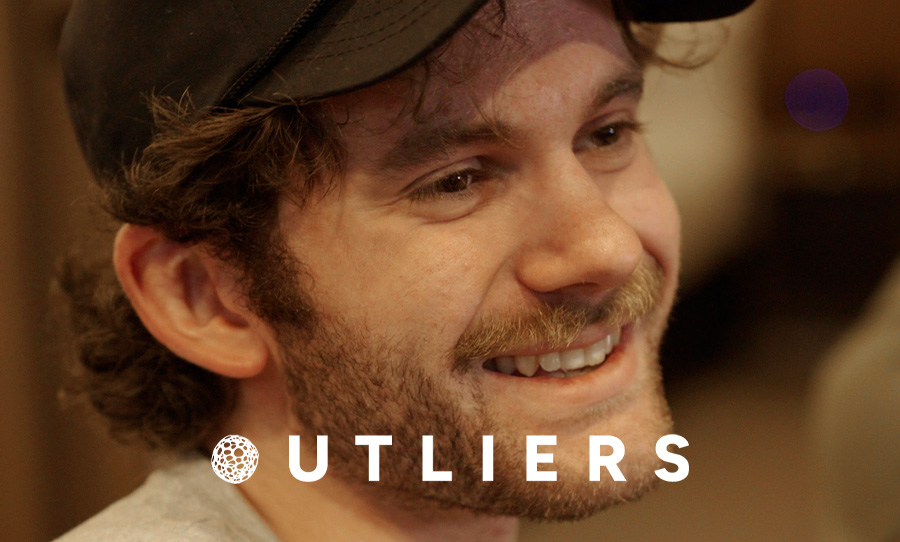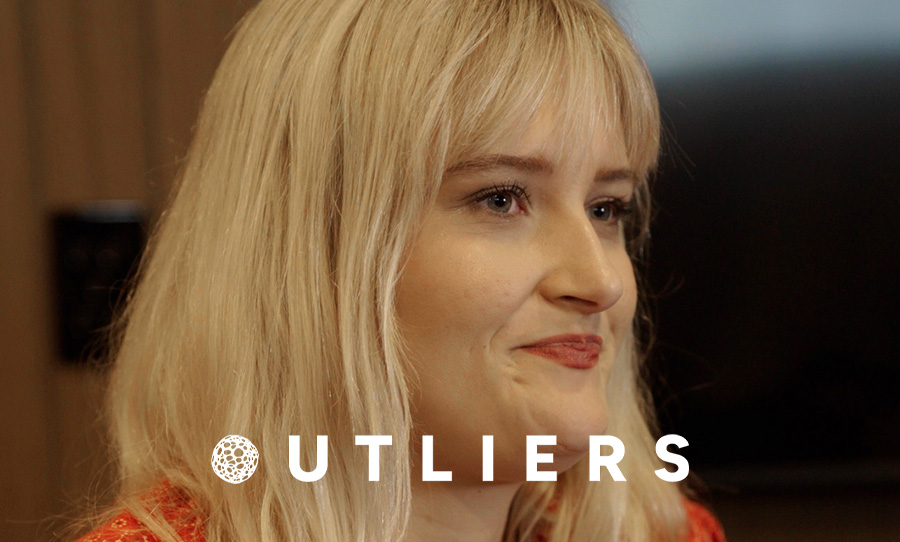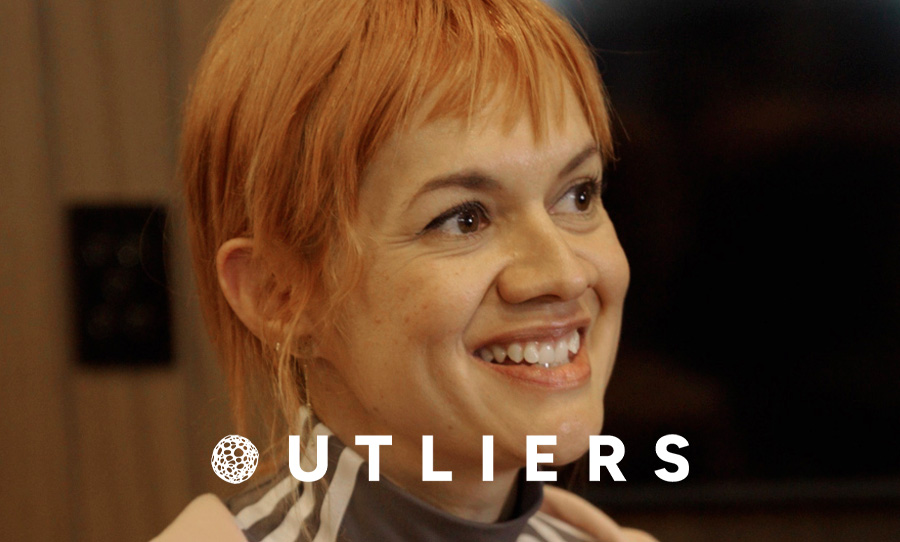When Jess Locke delivers her songs it’s with a depth and feeling that few can match. She draws sparks of inspiration from everyday life but is beholden to an idea that, at its most powerful, music conveys something greater than individual experience. If honest and universally relatable songs like Better/Bitter and Universe fall short of this lofty mark, it feels like she’s well on her path.
Her music may leak with a cool detachment, but in person at BIGSOUND she comes across as a sensitive and thoughtful artist. No stranger to her local music scene, she talks excitedly about supporting contemporaries and staunch advocates The Smith Street Band on tour as well as the host of Melbourne acts littering the festival bill.
When it comes to her art, she admits that her muse is something which frequently evades her. She’s gone years without the vital drive or passion to produce material. Fortunately, with a busy schedule and some modest momentum building toward a forthcoming long-player, Locke seems more eager to delve back into writing.
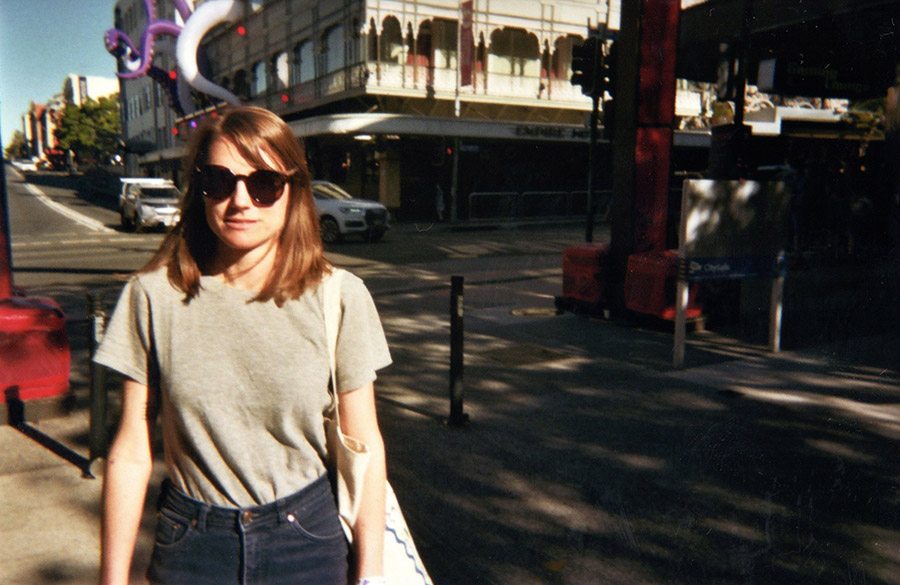
Catching up with Jess Locke at BIGSOUND she speaks openly about the ambitions, struggles, and emotions which define her creative process.
HAPPY: You’ve cited Leonard Cohen as an influence, is there a song or album of his that stands out as a personal favourite?
JESS: Definitely Songs From A Room and Songs of Leonard Cohen. They’re early influences, growing up those they got a fair bit of play. My parents were big Cohen fans.
HAPPY: You’ve been working quite closely with The Smith Street Band over the last year. Like Wil Wagner, your songwriting can be earnest, occasionally touching on some fairly strong themes of depression. Is it difficult bringing these personal aspects of your life out in your music?
JESS: I don’t find it difficult to bring them out or express them but sometimes the aftermath is awkward. Because I don’t find it awkward at all other people are like, “Are you okay!?” I’m like, “Yeah whatever.” I mean everyone gets depressed! I just see it as part of the spectrum of things which most people experience.
HAPPY: Are you afraid of putting too much of yourself or your life into a particular song?
JESS: It’s an interesting question. Starting out, especially when I was younger, I guess it was more of a kind of confessional thing. I needed to sing about my life and my experiences, that was kind of the point. Maybe as I get older and mellow out a bit I’m more interested in thinking more broadly and less personally. I guess I’m never afraid of giving too much as long as I’m happy with the art of it. It sounds really lame and I’m a bit embarrassed to say it but I feel like I’m satisfied when the way I’ve said something makes it something more than just my own emotions.
HAPPY: Would you say your creative process or relationship with music has changed a little bit?
JESS: Yeah, really organically though. It’s not something that I’ve consciously changed.
HAPPY: What else feeds you creatively?
JESS: Just the current political climate, but it’s always just coming from a place of trying to talk about something which feels real or honest. That might mean it’s something personal to me but I usually try and somehow understand a personal experience in relation to something bigger than me. Things tend to feel personal in my music in the same way that a very intimate relationship is inherently related to abstract relationships, other people, and the world. It’s about trying to just say something that makes something seem slightly different or expresses something to someone in a way they hadn’t thought of before, to relate or to connect to something.
HAPPY: Do you ever have “Eureka!” moments when you’re writing?
JESS: Yeah totally! I have eureka moments and I have cringe moments.
HAPPY: Your next album is coming out very soon. How would you position it in relation to 2016’s Words That Seem To Slip Away?
JESS: It’s kind of interesting because some of the songs on the new album are old songs…
HAPPY: Predating the last album?
JESS: At least one of the songs is quite old, so yes. But it was re-recorded so rather than the songwriting being necessarily new and transformative, it’s the recording and the band itself. I’m reworking songs, but they’ve also changed through the years in terms of what they mean to me. It’s taking the same thing and saying it again but it’s sort of just growing on its own – which is kind of cool!
But there’s also new songs on there so it’s still in the same vein as some of my other stuff. I didn’t start with a blank slate, I still feel like I’m playing catch-up! It’s a bit of a collection of things, but then the band and recording it in a certain space of time sort of keeps it held together as the same thing.
HAPPY: I think it’s interesting that out of all the artists I’ve had a chance to talk to at BIGSOUND so far, you’re one of the few who has actually put out an album recently as opposed to a string of singles or an EP. As an artist do you feel there’s a special significance in releasing music as an album?
JESS: I guess it’s familiarity, partly. It’s what I’ve grown up listening to. I think there’s something about the length of an album that kind of allows you to enter a space and sit in there, rather than just flicking from song to song.
HAPPY: But at the same time, you’ve been having a lot of success with your songs through triple j Unearthed and via streaming…
JESS: I’m a big advocate for just taking a bit of everything. I think there’s a benefit in releasing a single too. I’m totally not against that. I think that the main thing for me is just being able to actually create a lot of music. Part of putting out a single, a video and all that is all tied up in the industry, having a plan and trying to build an audience. That’s important and that’s why I’ve done that. But just being able to make the music, to put it out as I want to, is something that I’ve enjoyed doing in past.
HAPPY: Does that challenge you? Balancing the two competing notions of the creative and commercial? Or are you pretty comfortable with it?
JESS: I’m okay with it. I think in the past it’s been a mode of empowerment just to release stuff on Bandcamp, self-recording and things like that. In that sense, I liked generating a lot of stuff, but it just depends.
HAPPY: You’ve been supporting The Smith Street Band on these big sell-out tours. They keep jumping to bigger venues and performing to bigger crowds. Has it been challenging bringing your sound into these larger spaces?
JESS: It is different and it’s interesting. We toured with them last year, it was really good actually. Obviously, not everyone turns up for the supports, but the people who did turn up were so enthusiastic. Out of a venue that size we were playing to 100 people every night, which is more than we would play to for a headline show most of the time.
It’s cool that those people are all there just to check out the music! It was actually really positive, we got a lot from that. Smith Street fans are very particular. The megafans are just so excited.
HAPPY: Have you run into any of your own megafans? Those sorts of who people emerge, maybe not necessarily from the musical community, but from this wider audience…
JESS: There’s a lot of snobbery going around certain audiences you know? There’s musicians’ musicians and that’s great, but there’s also something humbling in seeing the pure love of high school kids or tradies that just love music. There are a lot of people out there who aren’t what you think your typical music fans are like. It might be nurses or teachers, they may not have the familiarity with someone niche, cool bands or whatever. It’s humbling just to be put out into that world. There’s a whole other world outside the music scene. So yeah, it’s been kind of cool.
HAPPY: How has BIGSOUND been for you so far? Is there an act that’s stood out for you or that you’re excited to see?
JESS: Already I’ve seen so many great bands just from yesterday. Jess Ribeiro was really awesome, Good Morning are really good, and I’m looking forward to seeing Jade Imagine tonight. Obscura Hail who I’ve played with a bunch of times in Melbourne are also playing. I’m probably forgetting heaps. I was a bit unsure on how it was all gonna be but yeah, it’s great just to be able to see a bunch of bands and meet a bunch of people I haven’t met.
HAPPY: What’s coming after BIGSOUND?
JESS: As soon as BIGSOUND is over we’re doing the big Jeff Rosenstock tour, then Poison City Weekender, and there’s another festival in October in Launceston. Then we’ll do our album and touring in November and some other touring probably after that!
HAPPY: Have you given any thought to songwriting?
JESS: I cannot wait! I’m thinking a lot about songwriting. I haven’t necessarily written a lot but I’m getting very inspired which is actually probably more important for me.
HAPPY: Would you say you’re one of those people who can’t write on the road?
JESS: I haven’t really been lately. Honestly, I don’t know if I can or not because I honestly haven’t had the time to try! But a lot of it for me – I go through phases. I’ve had years where I really just didn’t want to write anything and I was uninspired. I think we’ve been working so hard on practicing, recording and touring that I’m at the point now where I’m really excited to try out new things. Even if I’m not playing or writing on tour, when we’re on the plane or something I’ll just be thinking and getting all these ideas. It’s in there and I’ve got to capture it, otherwise it’s going to get away.
